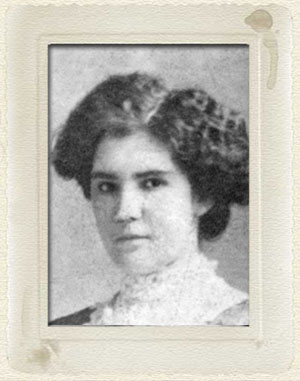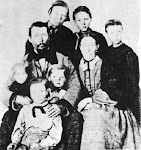2.04.2010
(82) Zemira's journal 1879, another letter to mother Phebe in Draper
The new year of 1879 was another year filled with hard work and dedication to his Church callings. His work was mostly similar to the previous year, with a few different interesting items, as follows:
“Went to Santa Clara to get some young Peach trees for setting out. Planting peach pits, wild ash seed, spreading sweet oil on alkali land, planting hedge, (muscrew seed), spreading dirt (4 days of this) picking cotton, the last of the season; cleaning drain ditch, plowing, setting out cottonwoods and black willows along the river, making waste gates, making head ditch to vineyards.”
Another letter written by Zemira to his mother, (still at Draper) is particularly revelatory. He wrote of his thoughts and feelings, his activities, and unintentionally reveals the confidence which the Church leaders had in him. It is appropriate to include it here.
Orderville Cotton Farm
Jan 30th 1879
Dear Mother,
Your letter of the 3rd inst. did not come to hand till the 25th. I was very glad to hear from you & Lovina once more, but sorry to learn that you were still suffering severely. I hope it will not last long. I was also glad to hear from William & Rhoda but I think it is strange that Joseph & Rhoda should part.
I should be very glad to pay you a visit & have a good talk before you leave us, but my situation is diferent now from what it used to be before I joined the Order. I not only have much to do with my hands but much to do with my brains, having charge of things here & building dams, raising cotton, fruit, tending bees, keeping the accounts & c are all new to me. Besides this I have all business matters to tend to, to buy what we do not produce within ourselves & to distribute to everyone their share of every-thing, which is very dificult to do so as to please every one. So you can see how dificult it is for me to get away.
Yet I think I will try & so arrange my affairs that I can come down there after the hurry of spring is over, but I cannot come before. We intend to put out a large vineyard & orchard this spring besides our crop of cotton & other things. As to the amount you will to me the letter does not state nor does it matter. I thank you all the same much or little. I care not for it however beyond something as a keep-sake, if there is enough to buy a good watch would prise it very highly as that I could have allways with me & would last my lifetime. If not, some cheaper thing.
Your unworthy Son. Z. Palmer.
=================
In February of 1879 in his diary he wrote: “Bro. E.M. Webb, Secretary of O.U.O. arrived. He has come down to settle up with us.” Then he had business of settling accounts and viewing the farm and dam. He attended a meeting in Washington where a tax of 1½ percent was voted to finish the schoolhouse and fence the lot.
In March he spent several days with planting; digging fruit trees and flower roots and currants and planting them, and setting out grape vines, planting melons and pruning vineyard, setting out willows along the river bank.
In the fore part of April he made his garden and set out grape cuttings, then near the middle of the month he started work on fixtures for weaving cotton; making warping bars, spooling frame and baddle, setting up the loom and getting ready for weaving.
In the middle of May he began hauling his first cutting of hay. On the 17th he gave Charles Lytle of Eagle Valley a Power of Attorney to sell his ranch in Dry Valley, Nevada.
The first mention he made in his diary of the cotton farm being called Enterprise was May 4, when he wrote: “Sunday A.M. Went with my wife to the new site for building to be called Enterprise. 4 P.M. Attended meeting at Washington, home Missionaries from Hebron & St. George were present.”
There has previously been some confusion concerning Zemira’s reference in his diary about Enterprise because of the town called Enterprise 40 miles north of St. George. It created much interest and prompted further research, with attempted trips to the general location. On page 78 of the book The Red Hills of November by A. Karl Larson, he mentions it briefly in the following explanation of the cotton farm:
“Above the dam (but below the present dam and now receiving water from its canal which is 45 feet higher than the old ditch) were several farms watered from the Virgin. There was the Westover farm which was located on the south bank of the river, so called because it was owned by Charles Westover and his family for a good many years following the time when it was known as Enterprise. This fine farm was owned during the time of the United Order by the community of Orderville who used it for the purpose of producing cotton for the Order’s mill in Long Valley Canyon.”
Following, we note from the heading of Zemira’s letter to his sister Lovina, that apparently he and his family were at the cotton farm which he called Enterprise. His mother, Phebe, passed away February 28, 1879.
Enterprise, Washington Utah Territory,
June 1st, 1879
Dear Sister, (Lovina)
I received your letter of May 17th yesterday & take this chance to reply. As I expect to go away for two or three weeks, I do not expect to come north very soon, so you may have what mother willed me. I did think I would have something got with it as a keepsake to remember her by but I think I shall not forget her very soon. If it is necessary for you to have an order from me to get it, you can show them this letter which will be sufficent I think.
We are tolerably well at present. I can see that I am gradually failing in strength of body as well as mind, & Sally is breaking down fast. I may say literally wearing out for she works as hard as ever, & will not be talked out of it.
We got some letters from the children in Arizona yesterday. Phebe has got another boy. Alma & Lydia were not in good health at the time of writing & Lydia has not been well for a long time. Up to present time they have had to buy & have their bread from a distance but have prospects of raising some wheat this season.
Well I have been writing to them & my hand is getting nervous & must quit soon. You speak as if your boys do not care much about religion which I am sorry to hear. Mine all but Alma are with me yet & seem to be pretty good boys. I do not know what I can say by way of encouragement or comfort, but the Lord is amply able & willing to comfort & provide for those who fully trust in him.
May peace & blessing attend you
As ever, your Brother & Friend
Z. Palmer
I did answer the letter you wrote since mother died. (28 Feb. 1879)
One other mention of the name of Enterprise in Zemira’s diary was that he made a bridge across the ditch on July 7, and then wrote: “July 9, 1879 On bridge and dugway at Enterprise point.”
==============
Spring and summer chores were much the same as previous years: plowing, planting, watering, hoeing, mending. He says: “measuring land, found we had 58 acres under cultivation.” Yet it is evident that his spiritual work and growth is very important to him for he put his Church work first.
In June he went to Orderville for general supplies and to attend conference. After three days of counsel with the Bishop and others, then several days of getting his loading, he returned to Washington. Had quite a trip home through Moccasin, Arizona. It was hot, dry, not much water for his team, and the oxen ran off and detained them. He said, at Washington several acres of cotton were destroyed by the wind blowing sand over it, excessively dry and windy weather.
July 27, Sunday “Bro. Heber Ayers from Orderville arrived this morning bringing cotton gin from Rockville which we had bought. Became sick and had to leave meeting.” He said he was being troubled with a pain in his head and he could not be out in the middle of the day for several days.
He had a busy schedule during the months of August, September, and October, at which time his diary ended. But he was always busy when his health and the weather permitted. Briefly the tasks of that month were recorded as:
August—staking grapevines, hoeing cotton, making frame to grindstone, fixing wagon, hauling rock, sowing lucern, fixing road, fixing bee cards, taking out honey, gathering beet seed, making adobe table, furrowing off and sowing turnips.
September—making window frames, making ax handles, making benches for scaffolding, writing, fixing bars, reading, balancing books, taking out honey, attending bees, repairing hives, making door frame, watering and pulling weeds, cutting corn, tending to water.
October—watering, striping and cutting cane, digging for foundation for gin house, quite unwell, working on cane mill, clearing water ditch.
The last entry in his diary was 9 Oct. 1879, “Frost last night, enough to injure cotton and cane.”
Subscribe to:
Post Comments (Atom)
Contributors

Lucile Brubaker (and her mother Lenna Cox Wilcock) are also contributing to this blog.





No comments:
Post a Comment